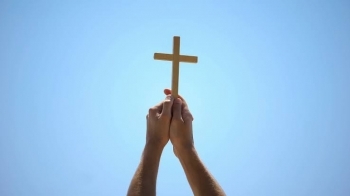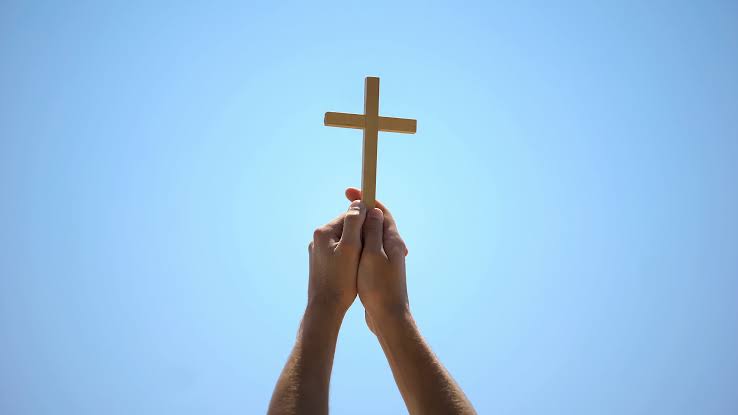
.jpg) Jose Vallikatt
Jose Vallikatt

St. Paul was in chains under a house arrest when he was composing the epistle to the Ephesians. As he was writing the final words of the epistle, he was certain that, sooner than later he would be appearing before the Roman courts. For a split second, Paul might have been intimidated, recalling the fate of persecuted Christians ranging from John the Baptist to Stephen the deacon. And his fears precipitated him to make a request of prayers to the ‘saints,’ the community of Christians he addresses.
The appeal (Ephesians 6: 19-20) contains the request for the ‘Word’ and ‘courage’ for him to speak during the trials. In front of Caesar, Paul is aware that all what he should defend is the Gospel, overcoming the temptation of any compromises. At the same time, he was aware that he was duty-bound to defend the Gospel as he considers himself an ‘ambassador (of Christ/Gospel) in chains.’
One gets a clear picture of what Christians should stand for both as individuals or as divinely chosen collective from the final chapter of the epistle to Ephesians. The sole goal of the Church is to defend Gospel in time and out of times. Borrowing the terminology of St Paul, this is a ‘warfare against the rulers, the authorities, and the cosmic powers of darkness.’
Christian Persecution
Christians in various parts of India are finding it increasingly difficult to live their religious and social life today. Their very identity is under threat both socially and religiously, evidenced from the reports such as vandalising of churches, desecration of holy places and artifacts, disruption of religious services, threatening people, making false allegations of religious conversions, pushing into legal troubles, forging letters in the names of Christians with a view to and almost explicitly suggesting that Christians are unwanted here.
The communal vendetta and hate speech spread in some states cannot be reduced simply as political strategy to consolidate Hindu electorate in view of the impending elections, but shall be seen as an organised programme of establishing Hindu nationalism thereby destroying the secular democratic nature of the country.
The threats are nevertheless exclusive to Christians, but also to other minorities, vulnerable groups and economically weaker sections. The India we are in today is much different from the one that fought the Britishers away; not even is it an India before 2014! Many international surveys have demonstrated that the quality of our democracy is dwindling, tolerance is declining, freedoms are curtailed, social security is withering.
Christian Response
Amidst the increasing xenophobia towards Christians what surprises the faithful as well as similar organisations that work for human progress is the inaction, indifference and trepidity of the pastors and leaders of the Church. As the right-wing fundamentalists were unleashing attacks on Church and the government bodies were reining the ecclesial institutions with stringent laws many faithful individuals and some organisations came up courageously to challenge the Government’s neglect for Christians.
Yet they waited desperately for a statement from the formal bodies of the Church such as bishop’s councils, media commissions, department of social justice, etc. Although Bishops like Peter Machado of the Bangalore Arch Diocese came up with very constructive public statements there was a deafening silence from the part of various key persons of Christian churches. People and faithful expected call for action from bishops themselves who have an esteemed profile nationally or locally.
Church’s Communication Crisis
The absence of public responses is indicative of a crisis and failure of communication in the Church. Church’s communication shall address two areas, namely ad intra and ad extra. The former signifies internal communication inspiring its faithful while the latter is response made to outer world to show what the Church stands for and what it is concerned about. Today, the Church not only falls short on instilling confidence and sense of unity among its members but also fails to come up with public statements and interventions that clarify or express its position on social issues.
It is unbelievable that an institution like Church whose raw material is logos is suffering from want of words! Theologically seen, Christians are supposed to be celebrants of the Logos (the incarnate Word) and heralds of Truth. That is to say, every injustice and falsehood is to be considered as an attack on the Logos which they are supposed to defend incessantly. On the other hand, they are to logically defend the objectives of the Church whose important role is to be a prophetic voice in the society. It is the mission of the Church to defend the people of all folks considering them as the children of God, when their plight is perilous.
Communication: Mission of the Church
Church’s primary mission is to communicate the Gospel. Living in a democratic society, it also involves defending the rights of the worshipers whose primary responsibility rests on the pastors. Three heroes from Bible can inspire the Church. First one is Moses, who before each plague (Ex. 7-12) faces King Pharaoh and courageously requests to free the Israelites from slavery. Moses did not fear a bit to encounter the King who had absolute political and military power.
The second is a set of three heroes, the three provincials of Babylon, namely Shadrach, Meshach, and Abednego, appointed by King Nebuchadnezzar (Daniel 3). Having refused to worship the royal idol, they were dumped into the burning furnace. The trio did not fear the all-powerful king and refused to worship a false god. The third one is Peter himself who defended faith very boldly (Acts 4:9-10). Peter’s two epistles are a call for courageous witness, in which he admonishes the elders to “shepherd the flock of God… not under compulsion, but willingly and eagerly, [and] not for shameful gain” (1 Peter 5: 2-3).
Unfortunately, the faithful and pastors in the Church feel that the hands and tongues of the ecclesiastical officers are tied like never before. The less Church steps back from socio-political scenario the more fundamentalist and hatemongering groups maltreat the Church. It should learn to make assertive talk guided by Christian charity and social respect. The bishops, being the successors of the apostles, and priests as their representatives, bear the obligation of defending the faith and the religious rights of the people of their care just as St Paul felt himself to be the ambassador of the Gospel.
Pitfalls
It’s not my intention to be pessimistic rather than be realistic to say that it will be a very hard task for the Church to overcome this crisis within, even if it wishes to.
First of all, the Church lacks intellectual and personal resources that can do precise socio-political analysis. The Church in India has failed either to develop or appoint competent persons (lay or ordained) as well as prepare resources and analytical tools to quickly respond to political developments.
Secondly, the Church personnel are ostensibly tongue-tied to respond in public. They have not been trained to perform in non-ecclesiastical public spaces. The Catholic Church has some best developed theology and magisterial teachings on communication as well as great infrastructure for media studies and public performance, but suffers from the poor human talents in the area.
Conclusion
In a social setting, where clever people play manipulative politics, Church cannot shy away from making its voice heard. The leaders are to value Gospel witness as well as social security of the faithful over their own short term personal advantages. Defending the rights of the poor and marginalised cannot be excluded from the prophetic mission of the Church.
It is important to encourage courageous sons and daughters of the Church to prophetically speak for the Church and open up ecclesial platforms for them. Above all, trusting the providence of the Lord and promptings of the Spirit, make all efforts to repair the degeneration constantly occurring in the Church. People look forward to a renewed Church which radiates Christ’s light.